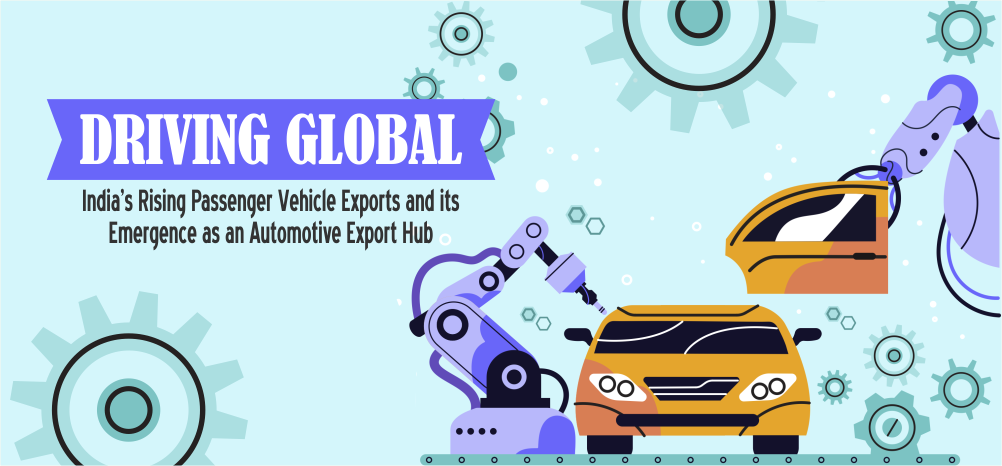India enjoys a strong position in the global heavy vehicles market, being the largest producer of tractors, the second-largest manufacturer of buses, and the third-largest manufacturer of heavy trucks in the world. Domestically, the automobile sector is divided into four segments: two-wheelers, three-wheelers, passenger vehicles, and commercial vehicles, with two-wheelers and passenger vehicles dominating demand. In FY25, two-wheelers accounted for 76.57% of market share, while passenger vehicles held 16.80%, with sales largely driven by small and midsized cars. Passenger car sales alone were valued at US$ 32.70 billion in FY21 and are projected to reach US$ 54.84 billion by FY27, registering a CAGR of over 9% between 2022 and 2027.
Production and sales volumes in India remain strong. In FY25, the total production of passenger vehicles*, commercial vehicles, three-wheelers, two-wheelers, and quadricycles stood at 3,10,34,174 units. In June 2025 alone, production across passenger vehicles, three-wheelers, two-wheelers, and quadricycles was approximately 24 lakh units, reflecting a 17% increase over June 2023. India also achieved a significant milestone with the sale of more than 20 lakh electric vehicles (EVs) in FY25, underlining the sector’s transformation. Automobile exports rose 19% to over 5.3 million units in FY25, led by strong demand for passenger vehicles, two-wheelers, and commercial vehicles in overseas markets.
The electric vehicles segment is poised for exponential growth, with the domestic EV industry projected to touch Rs. 20,00,000 crore (US$ 234 billion) and create around five crore jobs by 2030. The global EV market, estimated at around US$ 250 billion in FY21, is projected to grow nearly fivefold to US$ 1,318 billion by FY28. In India, the EV market is expected to grow at a CAGR of 36% between 2018 and 2026, while the EV battery market is projected to expand at a CAGR of 30% during the same period. With India on track to become the largest EV market by 2030, the sector presents a total investment opportunity of more than US$ 200 billion over the next five years.
Despite this rapid growth, India’s automobile sector still has vast untapped potential. Car ownership in India remains significantly below developed markets such as the US, China, and Europe, where 80-90% of the population owns a car, compared to just around 8% in India. This gap presents immense growth prospects, particularly as rising incomes and expanding infrastructure fuel demand. Global automakers like Kia Motors and Volkswagen have adapted their products to suit the preferences of India’s large middle-class population, competing directly with domestic firms and making the market highly competitive. The Government of India also expects the sector to attract US$ 8-10 billion in local and foreign investments, reinforcing its growth trajectory. Additionally, the automobile sector received a cumulative equity FDI inflow of about Rs. 2,48,683 crore (US$ 29.10 billion) between April 2000-March 2025.
On September 2, 2025, Tata Motors broke ground on a new greenfield vehicle manufacturing facility in Panapakkam, Ranipet district, Tamil Nadu, set to produce next-generation cars and SUVs for Tata Motors and Jaguar Land Rover.
On August 26, 2025, India’s EV push included 14,028 e-buses, 9,332 public charging stations, and over Rs. 54,000 crore (US$ 6.32 billion) in investments through PM E�DRIVE and PLI schemes to boost domestic manufacturing and green mobility.
The electric three-wheeler segment achieved record sales of 7,41,420 units in FY25. In this segment Mahindra and Mahindra Last Mile Mobility sold 78,524 units, the highest in the segment with a market share of 42.9%.
The Ministry of Heavy Industries has launched FAME- III Scheme, with a budget of Rs. 10,900 crore (US$ 1.29 billion) to promote electric mobility and reduce reliance on fossil fuels over a two-year period from April 1, 2024, to March 31, 2026.
On August 12, 2025, DPIIT signed an MoU with Hero MotoCorp to support early-stage startups via the ‘Hero for Startups’ accelerator, offering mentorship and R&D access.
On August 11, 2025, VinFast inaugurated its Rs. 16,000 crore (US$ 1.87 billion) EV assembly plant in Thoothukudi, Tamil Nadu, its first outside Vietnam, aiming to make the city a South Asian export hub with an initial capacity of 50,000 vehicles annually, scalable to 1.5 lakh units.
On August 2, 2025, Mahindra & Mahindra completed the acquisition of a 58.96% stake in SML Isuzu for Rs. 555 crore (US$ 64.9 million), aiming to expand its commercial vehicle market presence.
Tata Motors is set to invest Rs. 33,000-35,000 crore (US$ 3.86-4.10 billion) between FY26 and FY30 to bolster its passenger vehicle and electric portfolio, launching 30 new models, aiming for a 16% market share by FY27 rising to 18-20% by FY30, with Rs. 16,000-18,000 crore (US$ 1.87-2.11 billion) specifically allocated to the EV arm.
In July 2025, Maruti Suzuki India Limited has partnered with DPIIT, to support ‘Startup India’ innovators in mobility and manufacturing with mentorship, industry access, and testbed facilities to accelerate market-ready solutions.
Maruti Suzuki’s Kharkhoda plant (Haryana) began commercial production in February 2025, adding 2,50,000 units of capacity to lift India output to 2.6 million, supporting record exports and aligning with plans for a fourth Gujarat plant to reach 4 million units annually by FY31.
In FY25, Mercedes-Benz sold 18,928 luxury cars, the highest in the segment. While BMW is the second highest in the segment, it sold 15,180 cars in the same year.
On February 2025, TVS Motor Company announced a Rs. 2,000 crore (US$ 236.6 million) investment in Karnataka over the next five years to enhance its presence in the state through new infrastructure and expanded capabilities.
In January 2025, Force Motors Ltd announced securing an order to supply 2,429 ambulances to Uttar Pradesh's Health Department, enhancing the region's medical services.
In October 2024, Hyundai Motor India raised a record Rs. 27,870 crore (US$ 3.26 billion) through what became India’s largest-ever IPO, achieved via a fully subscribed offer-for-sale.
PM E‑DRIVE, started in October 2024, is India’s umbrella scheme to accelerate EV adoption and ecosystem support with a Rs. 10,900 crore (US$ 1.31 billion) outlay, encompassing e‑2Ws, e‑3Ws, e‑buses, heavy EVs, public charging infrastructure, vehicle testing, and localisation, with its tenure extended to March 31, 2028.
In 2024, Kinetic Green raised Rs. 214 crore (US$ 25 million) from Greater Pacific Capital as part of a Series A round.
In October 2024, Tata Passenger Electric Mobility, a subsidiary of Tata Motors Limited and pioneer of India’s EV revolution (TPEM), along with the Rajasthan Solar Association (RSA), has entered a Memorandum of Understanding (MoU) to promote electric vehicles (EVs) and the use of solar energy for EV charging in Rajasthan.
In January 2024, Hyundai Motor India Ltd. finalized the acquisition and transfer of specified assets at General Motors India's Talegaon Plant in Maharashtra and inked an MoU with the Government of Maharashtra committing to an investment of US$ 722 million (Rs. 6,000 crore) in the state.
In January 2024, at the Vibrant Gujarat Global Summit, Maruti Suzuki announced the investment plans in Gujarat with a New Greenfield plant and a fourth line in SMG.
In December 2023, Tata Passenger Electric Mobility Ltd. (TPEM) and Bharat Petroleum Corporation Limited (BPCL) signed an MoU to jointly establish 7,000 public charging stations nationwide to enhance customer satisfaction.
In December 2023, Maruti Suzuki India Limited entered into an agreement with the Government of Haryana to establish the second Japan-India Institute for Manufacturing (JIM) as part of its corporate social responsibility (CSR) initiative. The company will invest US$ 698 thousand (Rs. 5.8 crore) to upgrade the existing ITI Kansala into a JIM.
In December 2023, Hero MotoCorp announced a partnership with Ather Energy for an interoperable fast-charging network in India which will cover 100 cities with over 1900 fast-charging points.
In November 2023, TVS Motor announced its entry into the European market through a distribution agreement with Emil Frey, a renowned automotive distribution company with a century-long legacy.
In November 2023, SAIC Motor and JSW Group announced a strategic joint venture to accelerate growth with focus on green mobility.
In November 2023, Tata Motors inaugurated its state-of-the-art Registered Vehicle Scrapping Facility in Chandigarh.
In October 2023, Hero MotoCorp inaugurated its first state-of-the-art premium dealership in India.
In October 2023, Tata Motors signed a definitive agreement to acquire a 27% stake in Freight Tiger, a software-as-a-service (SaaS) company, for US$ 17.99 million (Rs. 150 crore).
In July 2023, Renault Nissan to invest US$ 1,68,762.86 (Rs. 1.4 crore) to upgrade infrastructure at eight schools near Chennai.
In July 2023, Mahindra & Mahindra is in advanced talks with British International Investment (BII) and some other global investors to raise up to US$ 602.72 million (Rs. 5,000 crore) for its electric vehicles (EV) unit.
In June 2023, Tata Motors will invest US$ 2 billion towards developing new products and platforms over the next four years.
In June 2023, Hero MotoCorp to invest up to US$ 180.81 million (Rs. 1,500 crore) for developing premium bikes and EVs in India.
In May 2023, Maruti Suzuki India plans to invest over US$ 5.5 billion to double capacity by 2030.
In April 2023, Power Finance Corporation Ltd (PFC) approves US$ 76.39 million (Rs. 633 crore) loan for 5,000 passenger EVs and 1000 cargo EVs.
In March 2023, the Central government sanctions US$ 72.41 million (Rs. 800 crore) under FAME India Scheme Phase II to Indian Oil (IOCL), Bharat Petroleum (BPCL), and Hindustan Petroleum (HPCL), for setting up 7,432 public fast charging stations across the country.
In the January-June period this year, Mercedes-Benz posted its best-ever half-yearly sales in India at 8,528 units, a growth of 13% a year-ago. During the same period BMW and Audi came at the 2nd and 3rd position with sales of 5,867 and 3,474 units, respectively.
In February 2023, Nissan and Renault plan to invest US$ 600 million in India over the next 3-5 years to expand their market share in passenger cars and electric vehicles.
In February 2023, German luxury car maker Audi India began local production of the Audi Q3 and Audi Q3 Sportback at the Skoda Auto Volkswagen India Private Limited (SAVWIPL) plant in Aurangabad.
In January 2023, MG Motor India planned to invest US$ 100 million to expand capacity, eyes 70% growth in 2023.
Tata Group Chairman, Mr. N Chandrasekaran said that "EV contribution in our portfolio is likely to increase to 25% in five years and reach 50% by 2030, thus significantly increasing investments in this sector“ in January 2023.
In January 2023, Global chief executive officer (CEO) Mr. Ola Kallenius said that India was Mercedes-Benz’s fastest-growing market worldwide in 2022 and plans on investing more.
India’s automobile sector is entering a transformative phase, fuelled by strong domestic demand, a growing electric mobility ecosystem, and sustained policy and investment support. With rising production capacities, increasing exports, and rapid adoption of next-generation technologies, the industry is well-positioned to expand its global footprint. Looking ahead, India’s automotive market is set to become a key driver of innovation, sustainability, and inclusive growth, reinforcing the country’s role as a global mobility hub.
Notes: *Data except for BMW, Mercedes, JLR, Tata Motors & Volvo Auto.
References: International Organization of Motor Vehicle Manufacturers, Media Reports, Press Releases, Department for Promotion of Industry and Internal Trade (DPIIT), Automotive Component Manufacturers Association of India (ACMA), Society of Indian Automobile Manufacturers (SIAM), Union Budget 2025-26














